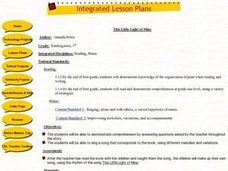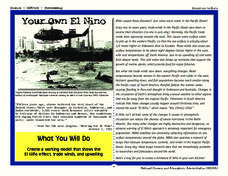Curated OER
A Colony is Born : Lesson 5 - Dear Mem
Discover colonies! Young historians will listen to a primary source journal entry read aloud with a backdrop of wave sounds. They discuss the entry, add historical facts to a chart and personal insights to another. Then they listen to...
Curated OER
America's Stone Age Explorers
Students watch a Nova program examining the earliest in habitants of the Americas. In groups. they take notes on various topics covered in the program. Among the topics covered are: the Clovis people, Solutrean culture, migration...
Curated OER
America's Underwater Treasures Viewing Guide
Students complete a worksheet while watching a video about how humans affect the ocean environment. They discover the need for a practice of balancing fisheries and their fishing practices. They examine how scientists use data to help...
Curated OER
A Miniscule Adversary: Combating Epidemics and Infectious Diseases in America
Tenth graders discover the spread of different diseases in US. In this health science lesson, 10th graders research the role of CDC and PHS in protecting the citizens. They explore documented cases of pandemics and their impact on...
Curated OER
The Puzzle of the Ice Age Americans
Students describe alternative theories for how the first humans cane to America. In this human origin lesson students study the origins of the first Americans.
Curated OER
Sustainable Agriculture
Students perform an experiment to find out if plants grow best when grown in soil with no fertilizer, with chemical fertilizers, or with compost that they have made themselves. Students discover how agriculture practices can benefit the...
Edgate
Discovering New Resources
What is a natural resource, and what resources did the Lewis and Clark expedition seek? After reading an article on the mapping of the west, learners get into small groups to discuss the important natural resources of the period. They...
Curated OER
This Little Light of Mine
Elementary schoolers discover how electricity travels and create an electron flow through a closed circuit. They work together to make a closed circuit and observe the electricity being made. This outstanding lesson plan is well worth...
SeaWorld
Animal Migrations
Here is a fabulous set of activities for your young scientists. Each instructional activity contains map, hands-on, and game activities that will help the class understand why and how animals migrate from one place to another. First...
Baylor College
Food Webs
Explore various ecosystems from around the world as your class discovers the interdependence of all living things. Using the provided sets of ecosystem cards, young scientists work in small groups building food webs to demonstrate the...
Baylor College
What Makes Water Special?
Get close up and personal with a drop of water to discover how the polarity of its molecules affect its behavior. Elementary hydrologists split and combine water droplets, and also compare them to drops of oil. Much neater than placing a...
Baylor College
What Dissolves in Water?
One of water's claims to fame is as the universal solvent. Young physical scientists experiment to discover which materials dissolve in this special compound. You could never be more prepared for teaching this lesson than by using this...
Baylor College
How Can We Find Out What Is in Water?
Using paper chromatography, water watchers discover that several substances might be dissolved even though they aren't visible. In this case, you will prepare a mixture of three different food colorings for them to experiment with. A...
Curated OER
Discover a Pond Food Web
Students study the biodiversity of animal life in a pond. They investigate the interdependence between pond organisms by completing a pond dipping activity and completing a checklist.
Cornell University
Too Much of a Good Thing?
Continuing their study of beneficial insects, young entomologists discover where in the world some of these bugs are. By labeling, coloring, and using the scale on a map, pupils explore the territories and arrival of the Asian lady...
NOAA
Your Own El Nino
Scholars make a model to discover how the force of trade winds over the Pacific Ocean creates an El Niño. Super scientists observe how the severe weather affects life in water and on land.
Curated OER
Massive Migrations
Here is an exciting exploration of a fascinating topic for your emerging ecologists: bird migration! They begin by visiting the US Fish & Wildlife Service website to discover which Arctic birds come to their areas. They are assigned...
BioEd Online
Bone Structure: Hollow vs. Solid
What is meant by the phrase "form follows function?" Allow your budding biologists to discover first-hand through two activities. In the first, groups work together to discover whether a solid cylinder or an empty cylinder can support...
American Chemical Society
Joseph Priestley, Discoverer of Oxygen
Do you want to hear a joke about nitrogen and oxygen? NO. We all know there is oxygen in the air and that plants produce oxygen, but how was it discovered? Scholars read a handout, answer questions, and analyze material in the...
Curated OER
Saving Sturgeon
Marine biology apprentices interpret data of sturgeon interaction with gill nets. They use the data to calculate the percentage of fish entangled in each twine size to discover if there is any correlation. This is a valuable exercise in...
Baylor College
How Much Water Do Humans Need?
Physical or life science learners measure the amounts of water eliminated by intestines and the urinary system, and the amounts lost via respiration and perspiration. In doing so, they discover that the body's water must be replenished...
Baylor College
Defending Against Microbes
In the preceding lesson from the unit, beginning biologists discovered that microorganisms are everywhere, so the question follows, why are we not sick all of the time? Class members read and discuss an article in small groups about...
KOG Ranger Program
Why a Bear Mattered: Smokey’s Story
Smokey the Bear has been telling people how to prevent forest fires since 1944, and continues to be the symbol of fire safety in America's wilderness. Young rangers visualize a dry forest and
Curated OER
Earthquakes: First Grade Lesson Plans and Activities
First graders explore how earthquakes release energy in a set of hands-on activities. During the pre-lab, they discover how energy from an earthquake releases waves through the earth using a water-filled cup and pebbles. Youngsters...

























